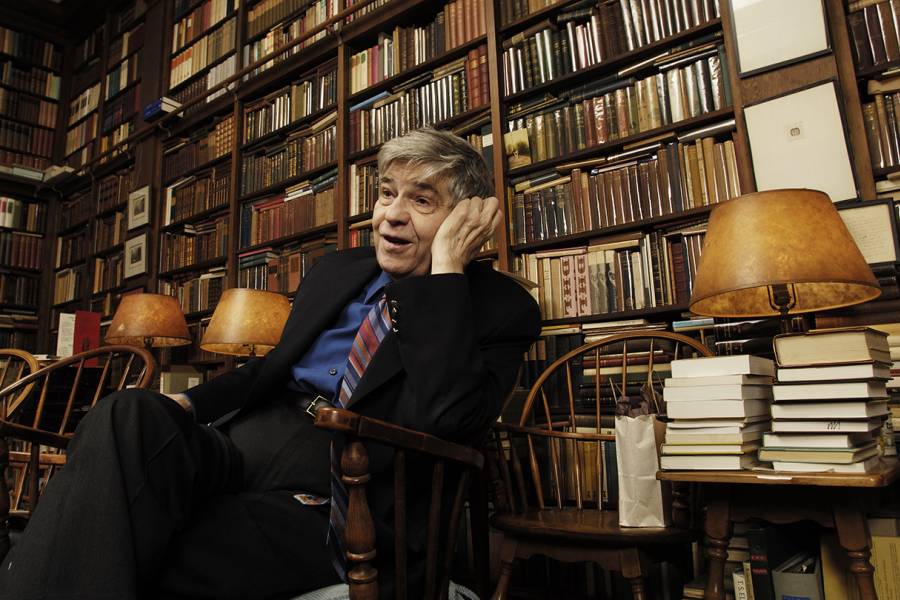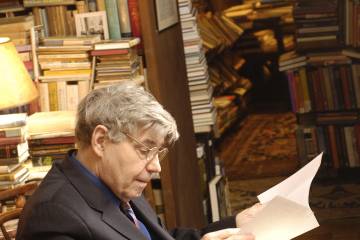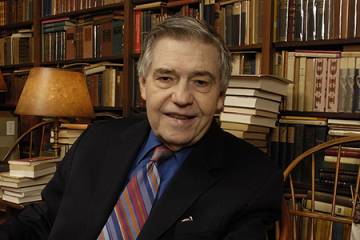"…and the inexpressible sweet expectation of happiness, of unknown mysterious happiness, took possession of him little by little, and life seemed to him enchanting, marvelous, and full of lofty meaning." —From Anton Chekhov, "The Student," one of Richard Macksey's favorite stories
Richard A. Macksey, a celebrated Johns Hopkins University professor whose affiliation with the university spanned six and a half decades, died Monday in the Baltimore area after an illness. He was 87.
A legendary figure not only in his own fields of critical theory, comparative literature, and film studies but across all the humanities, Macksey possessed enormous intellectual capacity and a deeply insightful human nature. He was a man who read and wrote in six languages, was instrumental in launching a new era in structuralist thought in America, maintained a personal library containing a staggering collection of books and manuscripts, inspired generations of students to follow him to the thorniest heights of the human intellect, and penned or edited dozens of volumes of scholarly works, fiction, poetry, and translation.
Macksey loved classical literature, foreign films, comic novels, and medical narratives—all subjects he taught at one time or another. Conversations with him were marked by a tendency to leap from one topic to another, connected by his seemingly boundless knowledge, prodigious memory, and sense of humor. For many at Hopkins and far beyond, he was no less than the embodiment of the humanities, both in intellect and spirit.
"Dick Macksey was a Johns Hopkins legend," says James Harris, a professor at the Johns Hopkins School of Medicine, director of the Developmental Neuropsychiatry Clinic, and a longtime friend of Macksey's. "He was a teacher, mentor, and friend to generations of Hopkins faculty and students. To me, he was the most erudite, kind, gracious, and considerate person I have ever known. He will be deeply missed and always remembered as the epitome of what makes Johns Hopkins a world-class university."
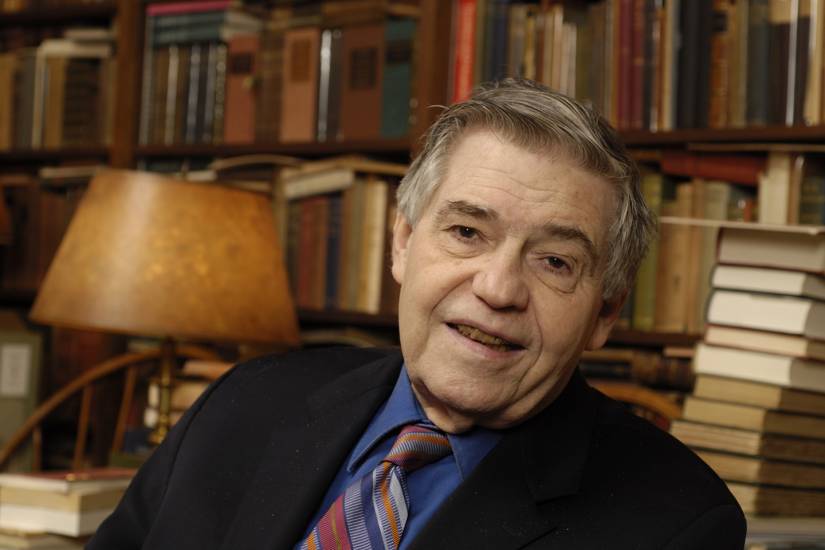
Image credit: Will Kirk / Johns Hopkins University
Born in New Jersey on July 25, 1931, Macksey planned to be a doctor and had launched his collection of medical books by the age of 5. After beginning his undergraduate studies at Princeton, he transferred to Hopkins and earned a bachelor's degree in 1953 and master's degree in 1954, both in Writing Seminars. He went on to earn a doctorate in comparative literature from Hopkins in 1957, writing his dissertation on Proust in French. While completing his thesis, he took a teaching position at Loyola College in Baltimore (now Loyola University Maryland) and after receiving his degree, returned to Hopkins as an assistant professor in the Writing Seminars. Quickly expanding beyond the writing workshops and "modern writers" courses he taught, he soon introduced a film class and initiated the first courses at Johns Hopkins in African American literature, women's studies, and scholarly publishing.
In 1966, Macksey led the charge in founding the Johns Hopkins Humanities Center—now the Department of Comparative Thought and Literature—as a meeting ground and incubator for problems, ideas, and discussions across disciplines. A degree-granting department, the Humanities Center sponsored graduate and undergraduate courses in literature, art, philosophy, and history; ran a graduate program; and maintained an active program of visiting scholars, professors, and lecturers. Macksey served as its director from 1970 until 1982, and he was a professor on its faculty until his retirement in 2010. Macksey continued to teach several courses until as recently as spring 2018.
The same year he launched the Humanities Center, Macksey joined French literary theorist and philosopher of social sciences René Girard, then associate professor of French at Hopkins, and deconstructionist and literary critic Eugenio Donato (both of whom co-founded the Humanities Center with Macksey) in convening an international symposium called The Languages of Criticism and the Sciences of Man. It was the first time that many leading figures of European structuralist criticism—including Jacques Derrida, Jacques Lacan, Roland Barthes, and Paul de Man—presented their ideas to the American academic community, throwing open a new conduit to avant-garde French theory and placing Hopkins at the center of an international intellectual conversation.
Video credit: Renee Fischer / Johns Hopkins University
At the symposium, Derrida first presented his groundbreaking critique of structuralism, creating an entirely new perspective on how philosophy, literature, and language relate to and affect one another. The symposium's proceedings became the landmark study titled The Structuralist Controversy. The gathering set an intellectual standard that no U.S. humanities conference since has been able to match in intensity or intellectual stature, and heralded—or perhaps precipitated—the field's shift from structuralism to post-structuralism.
The many sides of Richard Macksey
"Everyone talks about 'interdisciplinary,' but he taught as if teaching and learning was a work of art," says Caleb Deschanel, director and Oscar-nominated cinematographer who graduated from Johns Hopkins in 1966. "[Macksey's teaching style] covered all the bases. If you were studying literature in the 19th century, it related to the music and art and sociology of the time. It's really what learning was supposed to be about. What it taught me was the fact that learning is about everything at the same time. Richard Macksey could somehow weave together all the elements and all the aspects of human existence into one thing, and that's what made him so great."
While a student, Deschanel proposed a film class to Macksey, who responded, why not? The class created a 16mm film, and Deschanel says that ever since, his work has been informed by the way Macksey taught him to question his instincts and search for the universal. He learned not to think of a piece of literature just as literature but as a work of art in a period of time, and about what we can learn from those universal ideas. "He taught you how to explode all the myths about things and come to the truth about what they were. Every time I do anything, my first thing is to doubt my first instincts about it. He saw learning and teaching the way we think of a work of art."
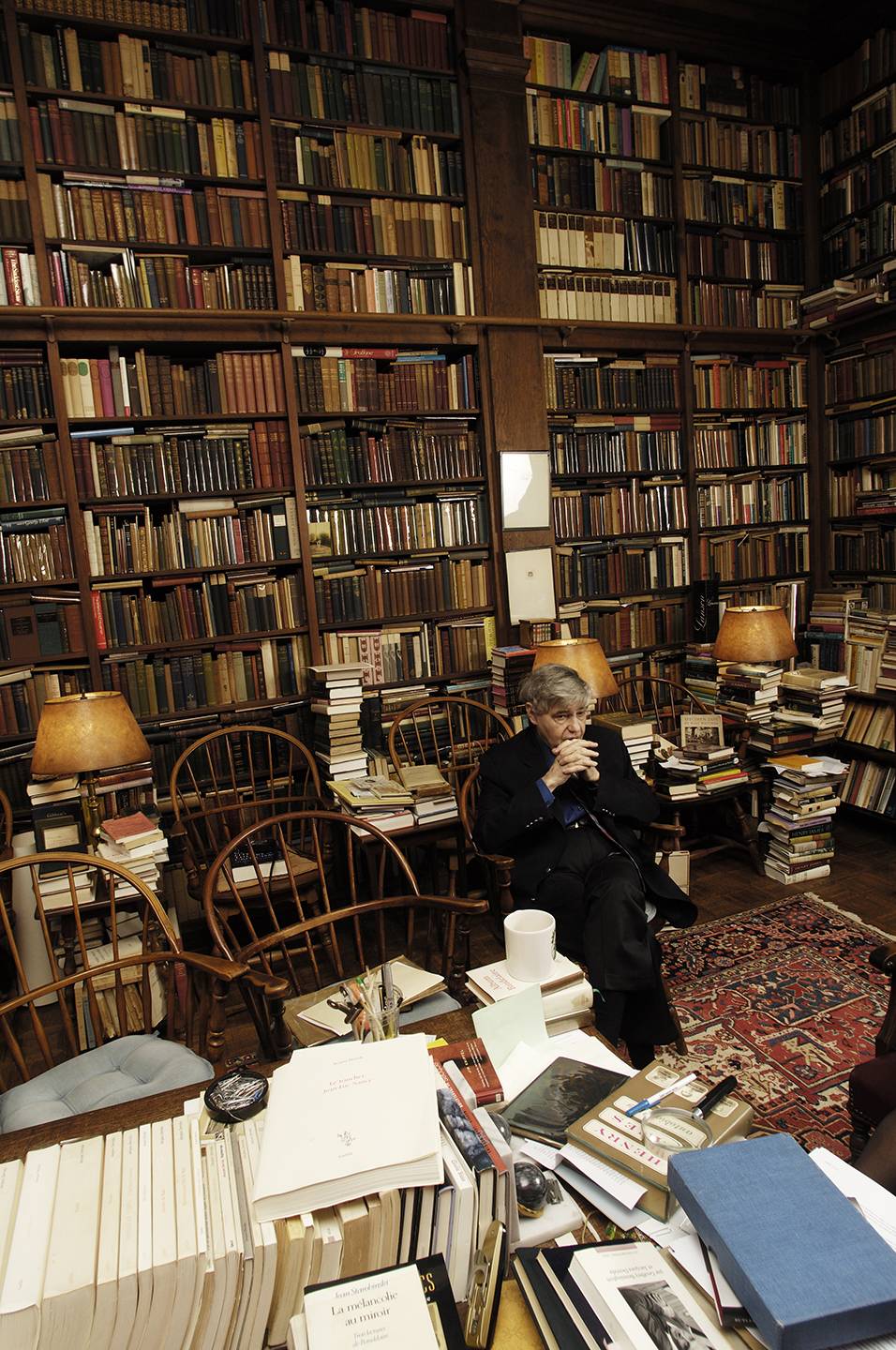
Image credit: Will Kirk / Johns Hopkins University
More than leading a life of aloof intellectualism, Macksey also existed fully on the human plane. A night owl, he was regularly spotted grocery shopping and volunteering at Baltimore's The Book Thing late into the evening and in the early morning hours; he liked to solve the trivia questions posed during Orioles games at Memorial Stadium; and he featured his cat, Buttons, as his Facebook cover photo. A fan of film and film history, Macksey was an inaugural founder and supporter of the 1970s Baltimore Film Festival, a predecessor of today's Maryland Film Festival.
It may have been partly due to his ability to exist on just a few hours of sleep that his presence had a way of being ever-present. Former student Rob Friedman, who graduated in 1981, remembers waking up at 1 a.m. to hear Macksey's voice drifting through his apartment window, and glimpsed the professor walking down St. Paul Street and "yakking with five students." On another occasion, Friedman awoke early and stepped outside at 6 a.m., only to find Macksey driving by and waving.
"He was so brilliant and had such an encyclopedic memory, and was also such an exuberant personality. He loved learning, he loved talking about what he was learning, and he also loved learning about what you had to say," Friedman says. "It's the generosity of his spirit and his contagious love of learning and excitement in sharing that learning. He might suddenly quote something in Greek."
Friedman met Macksey in 1977 when a friend advised him to get to know Macksey because of his sense of humor. Friedman left a funny note on Macksey's desk and the next day received an interoffice envelope with a humorous response. The two began sending comedic lines back and forth, and Friedman switched his major to humanistic studies so that Macksey could be his adviser.
"I was extremely unhappy during my college years, and if it hadn't been for him I wouldn't have finished school," Friedman says. "He really made a substantial difference in my life, not just academically but personally. I can't express the magnitude of my gratitude for Dick. There are probably 64 years' worth of people that—behind the scenes—he looked after."
Over the years, Macksey was celebrated for that dedication to teaching and received numerous awards. He also established awards in his name. In 1992, Macksey received the university's George E. Owen Teaching Award, given annually for outstanding teaching and devotion to undergraduates. In 1999, the Johns Hopkins Alumni Association awarded him its Distinguished Alumni Award, and the same year the Richard A. Macksey Professorship for Distinguished Teaching in the Humanities was endowed by former student Edward T. Dangel III and his wife, Bonni Widdoes. The professorship is currently held by author and Writing Seminars professor Alice McDermott.
In 2010, Macksey received a Hopkins Heritage Award, which honors alumni and friends of Hopkins who have contributed outstanding service over an extended period to the progress of the university or the activities of the Alumni Association. The Alexander Grass Humanities Institute hosts the Richard A. Macksey Lecture annually, and the Macksey Award is given each year to the graduating member of the Johns Hopkins chapter of Phi Beta Kappa who took the most academic risks.
Bridging medicine and the humanities
Famous at Hopkins for riding a Harley Davidson motorcycle to class in Gilman Hall and for the ever-present pipe between his teeth, Macksey held joint appointments in Writing Seminars and in History of Medicine at the Johns Hopkins School of Medicine, where he co-directed the Humanities Programs starting in 1990. With neurosurgeon George Udvarhelyi, he co-founded the School of Medicine's Office of Cultural Affairs in 1977 as a cross-campus initiative to engage in rigorous inquiry between the humanities and arts and health, science, and the delivery of care. Starting with just a few resources, the pair attracted funding from the National Endowment for the Humanities and the National Endowment for the Arts to bring in speakers with international reputations in medicine and the humanities, including Primo Levi and Umberto Eco.
"Because of Dick Macksey's legacy, we can position Hopkins as a key center of the intersection of humanities and medicine," says Jeremy Greene, professor of medicine and the history of medicine and director of the Institute of the History of Medicine. "He really blazed a path between the two campuses that many people have been able to follow since, and draw closer together the relevance between the humanities and medicine in the 21st century."
In 1992, Catherine DeAngelis, then the School of Medicine vice dean of academic affairs, received a grant to update the 75-year-old medical school curriculum. Wanting to familiarize med students with literature, poetry, theater, and the arts, she asked Macksey if he would assist in developing a four-year course called Physician and Society.
"I could think of no one better to teach in that course than Dick Macksey even though he wasn't in the School of Medicine. He really made that course so special, and I learned a lot from him by sitting in," says DeAngelis, now University Distinguished Service Professor Emerita and professor of pediatrics emerita.
"He was absolutely brilliant, but if you talked to him you would never know from him how brilliant he was," she adds. "He was approachable, and just so kind."
Generosity of spirit
Macksey was beloved for his generosity, the way he fully devoted himself to every conversation and cared about every person and his or her ideas. He thrived on engaging with everyone, eagerly giving his attention to students' thoughts and to them as people, and he never met a conversation or topic he didn't find interesting.
"Dick, of course, was brilliant, with a superb and elegant command of language, and that extraordinary memory," says John Astin, theater program director and Homewood Professor of the Arts. "Beyond that, he was a cherished companion, possessing infinite kindness whom I shall miss always. The world is less without him but much better for having had him for a time."
Friedman remembers one student who had discovered an obscure Portuguese poet, read a translation, and wanted to learn more. The student approached faculty in what is now the Department of German and Romance Languages and Literatures, but no one was familiar with the poet. Someone advised him to ask Macksey if he'd heard of him. "He said, 'of course,' and handed him an entire file of research and the poet's life history," Friedman says.
"I visited him two weeks ago when he was still able to talk and even laugh despite being bedridden," says Richard Chisolm, a documentary filmmaker whom Macksey hired to teach film at Hopkins in the 1980s and '90s, and a friend of Macksey's for 40 years. "He was a one-of-a-kind intellectual giant and a joyful teacher who was never self-centered; always filled with good humor, curiosity, and an intense love of conversation—in over a dozen languages."
A legendary library
In 1972, Macksey and his wife, Catherine Macksey, converted the garage of their home into a library. But his sprawling collection was never confined to its walls, spilling into bookshelves throughout their home and even occupying the steps of the ladders intended to access the upper shelves. "Chez Macksey," as it was fondly known, was where he frequently held classes and film viewings and subsequent discussions, and Macksey and his students would compete with those books for space around a table late into the night, often fueled by cookies and pipe smoke, while works of fine art looked on.
"Students for decade after decade have reveled in the life of that house: To be around a world of learning, enthusiasm, watching movies in the wee hours, listening to this expansive mind firing off in seven directions at once, and learning something they never knew before," Friedman says.
The collection holds not only an impressive number of diverse titles but also, scrawled in the margins, insights into Macksey's mind. He would frequently write on the pages, creating a sort of correspondence with the authors. His wife, a French scholar at Hopkins who died in 2000, also annotated her books, and Macksey told author Jessie Chaffee several years ago that he continued to "find" Catherine in the annotations she'd made in books.
"He was always engaging with the author, either in agreement or in argument," says Winston Tabb, Sheridan Dean of University Libraries, Archives and Museums. "[What you see is] essentially two minds operating together in one text—the author and a very intelligent reactor."
Equally impressive, says Tabb, is the fact that no current catalog exists: "The catalog was in Dick's mind."
A funeral mass will be held at 11 a.m. on Tuesday, July 30, at Loyola Alumni Memorial Chapel at the Loyola University of Maryland. A reception will follow in Gilman Atrium of Gilman Hall on the Johns Hopkins University Homewood campus.
Posted in Arts+Culture, Politics+Society
Tagged obituaries, humanities, richard macksey




